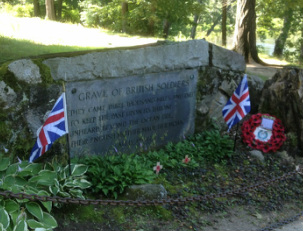
If you've forgotten some of your American history, let me remind you that this is the spot where the American Revolution began with the Battle of Concord on April 19, 1775. The poet, Ralph Waldo Emerson, immortalized the battle in his poem, "Concord Hymn," as the "shot heard 'round the world."
Emerson wrote those words in 1837 for the dedication of the monument that now stands on the east side of the Old North Bridge. Just a few yards away from that obelisk — easily overlooked — there is a much smaller monument dedicated to two British soldiers who died in the Battle of Concord. The British, in the fury of the battle and facing a long retreat back to Boston, were not able to recover the bodies of these two men. Instead, the American colonists buried them close to the place where they fell.
To this day, two small British flags (accurate to the time of the Revolution) are placed on the spot. An inscription bears words from a poem by James Russell Lowell:
They came three thousand miles and died,
to keep the past upon its throne:
Unheard, beyond the ocean tide,
their English Mother made her moan.
My eight-year-old daughter had a hard time identifying the country against whom the Americans fought a bloody war to win their independence. To her, Great Britain (now the United Kingdom) is the country where they make Doctor Who, her older sister's favorite television show. It is the place where her mother's favorite author, Jane Austen, lived and wrote. Hardly the stuff of bitter enmity.
The small monument to the two British soldiers, also, says something about the attitude of contemporary New Englanders to their "English Mother." They love their ancestral connection to Britain and, as in Lowell's poem, they are much more inclined to think of the Red Coats who fell here with compassion than with bitterness. After the long decades, and especially since the experience of two world wars, Americans now view their one-time arch-villain as a partner and beloved cousin across the waters.
This week's Torah portion (Ki Tetze) suggests that this is the proper way for enemies to be reconciled into friendship. The lesson comes in a surprising verse that says, "You shall not abhor an Egyptian, for you were a stranger in his land" (Deuteronomy 23:8). Even someone with only a casual familiarity with the Torah will know that the Israelites had more reason to hate Egypt than any other nation. It was Egypt's Pharaoh who enslaved Israel with cruel servitude and ordered their baby boys to be thrown into the Nile. Why would this same Torah command Israel "do not abhor an Egyptian"?
The medieval commentator Rashi explains that the commandment applies to those Egyptians who convert to Judaism. They are permitted to do so and are welcomed into the fold of the Jewish people, as are all converts. Rashi says, though, that our compassion toward Egypt is not only because of the many centuries that separate us from the ordeal of slavery. It is also out of remembrance of the fact that, before we were slaves, the Egyptians took us in with friendship when we were on the brink of starvation in our own land.
Torah commands us to remember the best about other people, even of our enemies, and to welcome them as brothers and sisters. Just as Americans have long forgotten the hatred we once had toward the British — and now remember only the gifts of language, culture and fellowship in arms — so should we as Jews foreswear from hating those who once were our enemies.
In contemporary times, we have seen this happen. Today, Germany is one of Israel's strongest allies. One hardly ever hears Jews speak scornfully about contemporary Germany, and Jews accept the many sincere expressions of contrition that Germany has offered for its Nazi past. You would think that if the Jewish people could forgive Germany, there is no nation that we would not be willing to see in the best possible light, to accept, and to forgive.
The Jewish people today certainly have enemies. The commandment, "You shall not abhor an Egyptian," does not require us to love people who are trying to kill us. But, it should be a reminder to us that there is no enmity that cannot be overcome, whether it is a personal enemy or a national enemy. Americans build monuments to British soldiers who once shot at us. Jews find friendship with a country that once committed genocide against us. Surely, we can recognize in our hearts the ability to find reconciliation and peace with those we once saw as enemies.
It has been commanded of us to do so.
Other Posts on This Topic:
Bereshit: First Crime, First Punishment
Ki Tetze: The Bird's Nest and the World Trade Center

 RSS Feed
RSS Feed
